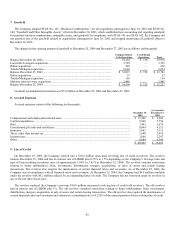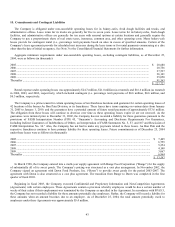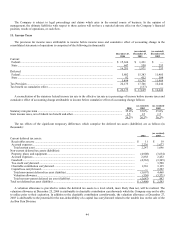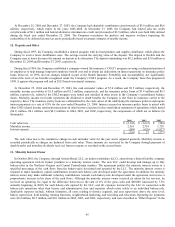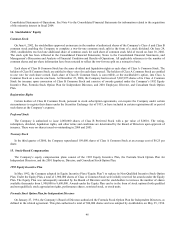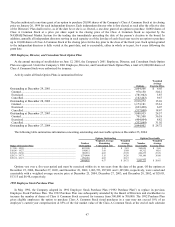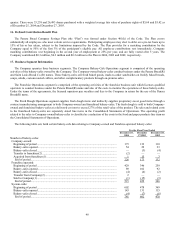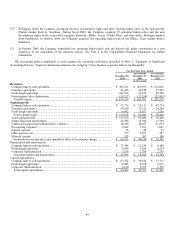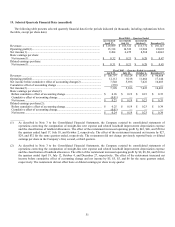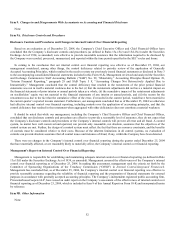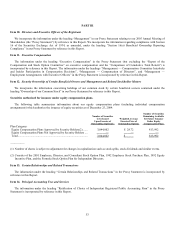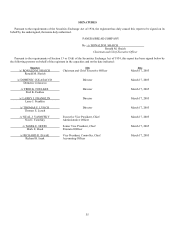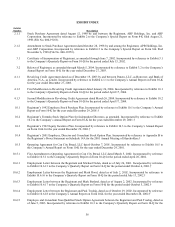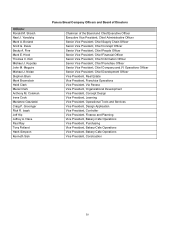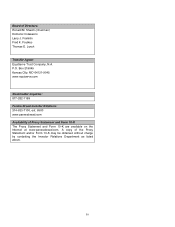Panera Bread 2004 Annual Report Download - page 58
Download and view the complete annual report
Please find page 58 of the 2004 Panera Bread annual report below. You can navigate through the pages in the report by either clicking on the pages listed below, or by using the keyword search tool below to find specific information within the annual report.Item 9. Changes in and Disagreements With Accountants on Accounting and Financial Disclosure
None.
Item 9A. Disclosure Controls and Procedures
Disclosure Controls and Procedures and Changes in Internal Control Over Financial Reporting
Based on an evaluation as of December 25, 2004, the Company’s Chief Executive Officer and Chief Financial Officer have
concluded that the Company’s disclosure controls and procedures (as defined in Rules 13a-15(e) and 15d-15(e) under the Securities
Exchange Act of 1934, as amended) were effective to provide reasonable assurance that the information required to be disclosed by
the Company was recorded, processed, summarized, and reported within the time periods specified in the SEC’s rules and forms.
In coming to the conclusion that our internal control over financial reporting was effective as of December 25, 2004, our
management considered, among other things, the control deficiency related to periodic review of the application of Generally
Accepted Accounting Principles, which resulted in the need to restate our previously issued financial statements as disclosed in Note 3
to the accompanying consolidated financial statements included in this Form 10-K. Management reviewed and analyzed the Securities
and Exchange Commission’s Staff Accounting Bulletin (“SAB”) No. 99, “Materiality,” Accounting Principles Board Opinion 28,
“Interim Financial Reporting,” paragraph 29 and SAB Topic 5 F, “Accounting Changes Not Retroactively Applied Due to
Immateriality.” Management concluded that the control deficiency that resulted in the restatement of the prior period financial
statements was not in itself a material weakness due to the fact (i) that the restatement adjustments did not have a material impact on
the financial statements of prior interim or annual periods taken as a whole, (ii) the cumulative impact of the restatement adjustments
on stockholders’ equity was not material to the financial statements of any interim or annual periods, and (iii) the reason for the
restatement was due to the fact that the cumulative effect of the error, if recorded in the current period, would have been material to
the current quarter’s reported income statement. Furthermore, our management concluded that as of December 25, 2004 we otherwise
had effective internal control over financial reporting, including controls over the application of accounting principles, and that the
control deficiency that resulted in the restatement when aggregated with other deficiencies does not constitute a material weakness.
It should be noted that while our management, including the Company’s Chief Executive Officer and Chief Financial Officer,
concluded that our disclosure controls and procedures are effective to provide a reasonable level of assurance, they do not expect that
the Company’s disclosure controls and procedures or the Company’s internal controls will prevent all error and all fraud. A control
system, no matter how well conceived and operated, can provide only reasonable, not absolute, assurance that the objectives of the
control system are met. Further, the design of a control system must reflect the fact that there are resource constraints, and the benefits
of controls must be considered relative to their costs. Because of the inherent limitations in all control systems, no evaluation of
controls can provide absolute assurance that all control issues and instances of fraud, if any, within the Company have been detected.
There were no changes in the Company’s internal control over financial reporting during the quarter ended December 25, 2004
that have materially affected, or are reasonably likely to materially affect, the Company’s internal control over financial reporting.
Management’s Report on Internal Control Over Financial Reporting
Management is responsible for establishing and maintaining adequate internal control over financial reporting (as defined in Rule
13a-15(f) under the Securities Exchange Act of 1934, as amended). Management assessed the effectiveness of the Company’s internal
control over financial reporting as of December 25, 2004. In making this assessment, management used the criteria set forth by the
Committee of Sponsoring Organizations of the Treadway Commission (“COSO”) in Internal Control-Integrated Framework.
Management has concluded that, as of December 25, 2004, the Company’s internal control over financial reporting was effective to
provide reasonable assurance regarding the reliability of financial reporting and the preparation of financial statements for external
purposes in accordance with generally accepted accounting principles. The Company’s independent registered public accounting firm,
PricewaterhouseCoopers LLP, have issued an audit report on the Company’s assessment of the effectiveness of internal control over
financial reporting as of December 25, 2004, which is included in Item 8 of this Annual Report on Form 10-K and incorporated herein
by reference.
Item 9B. Other Information
None.
52


